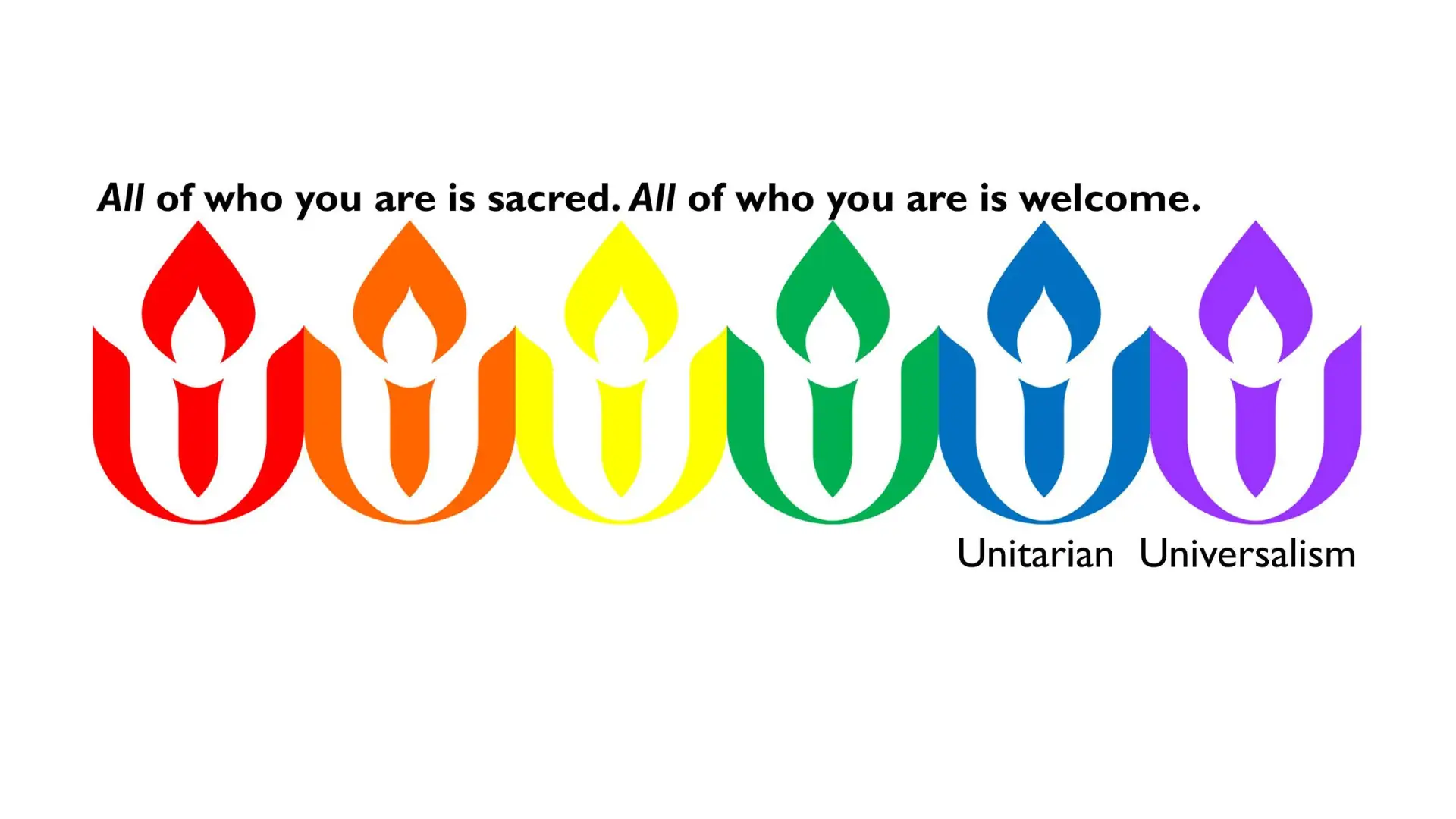The Unitarian Universalist Association recently updated its language around its purposes, values and covenant among members. Across the United States and beyond, members expressed “love at the center” theme with six supporting values: justice, equity, transformation, pluralism, interdependence and generosity.
Some teaching spaces are using a shorthand, JET-PIG, for the supporting values, presented here in its flower image where the petals surround the UU symbol of the chalice and the word “love” literally at the center.
An astonishing development took place when the Unitarian Universalist Association was formed in 1961. Two separate Christian traditions merged into one new association that was not exclusively Christian!

Unitarians had held that since the Bible never talks about a trinity explicitly, that trinitarianism was not a requirement of being a Christian. After the Council of Nicaea in 325, Emperor Constantine asserted that God the Father, God the Son and, by the way, also, the Holy Spirit were all eternally in existence and to believe in God and Jesus in any other way was, well, wrong. By point of sword everyone needed to profess this new, developing, otherwise being discerned by everyone, weirdly specific trinitarian theology exactly this way. The Bible was not even a compiled thing yet! “Who was Jesus?” was still a very real, honest, common question. By August in the year of our Lord 325, there was one answer. And so, in many ways, it remains this way today in the U.S.A. What matters most right here, though, is that Unitarians were (and are) Christians committed to God and Jesus Christ.
Universalists were (and are) Christians too! The short version, in my mind anyhow, is that they believe that everyone – universally – goes to heaven. It just does not make sense to Universalists that a good, loving God doesn’t have a plan, a way, the power, the heart to avoid sending people to hell. Everyone has the chance to be redeemed into heaven before or after death. God is neither mean nor unable to remedy hell. Most Christians certainly proclaim God is all knowing, all loving, all powerful, so it makes sense that all Christians might be Universalists if they were presented with this theological option.
The vision to widen the circle of the new religion that was formed in 1961 was genius. Christians have been murdering other Christians (but not only Christians) since at least Constantine and the Council of Nicaea in 325 for not believing exactly “the right” thing according to some other human or mythically “perfect” Bible. To this day, I still have Christians, lay and clergy, who call my belief in God in Jesus Christ “non-salvific,” blasphemous or, basically, not good enough. What human gets to decide that for another human? People who have (or claim) zero percent doubt scare the daylights out of me … and I use to be one of them!
“The Bible says …” Yep, I said it. The Bible says that one only needs to have the faith of a tiny, tiny mustard seed and I respect that. I have much more admiration for the person who is retaining 1% faith and 99% doubt than the other way around. People with too little doubt, too little ability or permission to question, introspect, hear other ideas, beliefs, and opinions can be easily manipulated and/or convinced into harming people “in the name of love,” or God, or country.
Unitarian Universalism allows me the space to truly consider what is true and what is false so that I do not worship a false god or idol, so that I can distinguish what seems loving and what is truly loving. In Christianity we were also taught that one’s yes cannot be yes unless one’s no could freely be no. That is, if one’s culture, society, religion, family, friends, peers, pastors pressure, guilt, shame us when we say any measure of ‘no,’ then our ‘yes’ is just conformity. Some talk about this as the difference between ‘yes’ and ‘hell, yes!’ Unless someone’s ‘yes’ is ‘hell, yes’ then we should hear it as a ‘no’ or at least ‘not yet’ or ‘not now.’
I meet lots of people out and about in the world who are either looking for a church or don’t believe they belong in any church. And maybe the word ‘church’ is loaded and problematic; I certainly think so. Alas, feel free to translate it as ‘community,’ ‘fellowship,’ or something that works for you. People typically feel some sort of judgement by a church, congregation or pastor, usually for legitimate reasons. We’ve instilled an expected sense of guilt into society for people if their life, or partner’s life, deviates in any way from a perceived church value system.
People who are ‘spiritual but not religious’ typically don’t gather but may want emotional support or community connectedness. Who is their pastor? Who are their people? What about every couple that has even slightly different backgrounds? Where do they fit?
What about non-religious people, atheists, humanists, naturalists? Where do they belong? What about people who believe in equity and justice – all justice? Who are the faith leaders who are speaking up and loving transgender youth, who are vocally antiracist? Unitarian Universalists are far from perfect. We have a very long way to go. We are not, and will never be, “woke.” We are, however, committed to the loving work of justice, equity, transformation, pluralism, interdependence and generosity, to name a few values.





